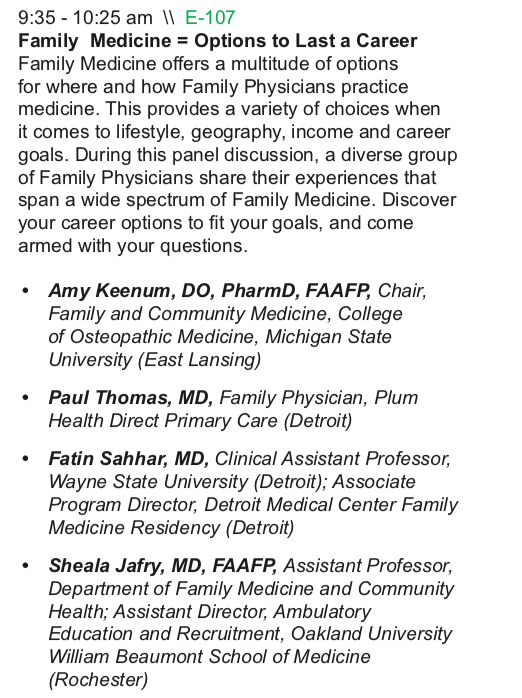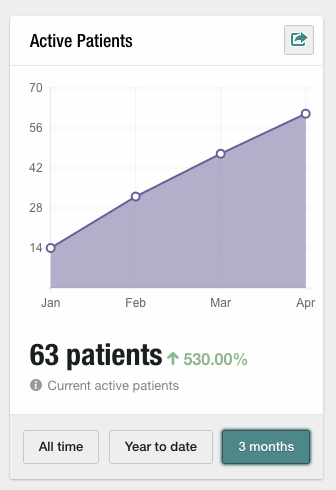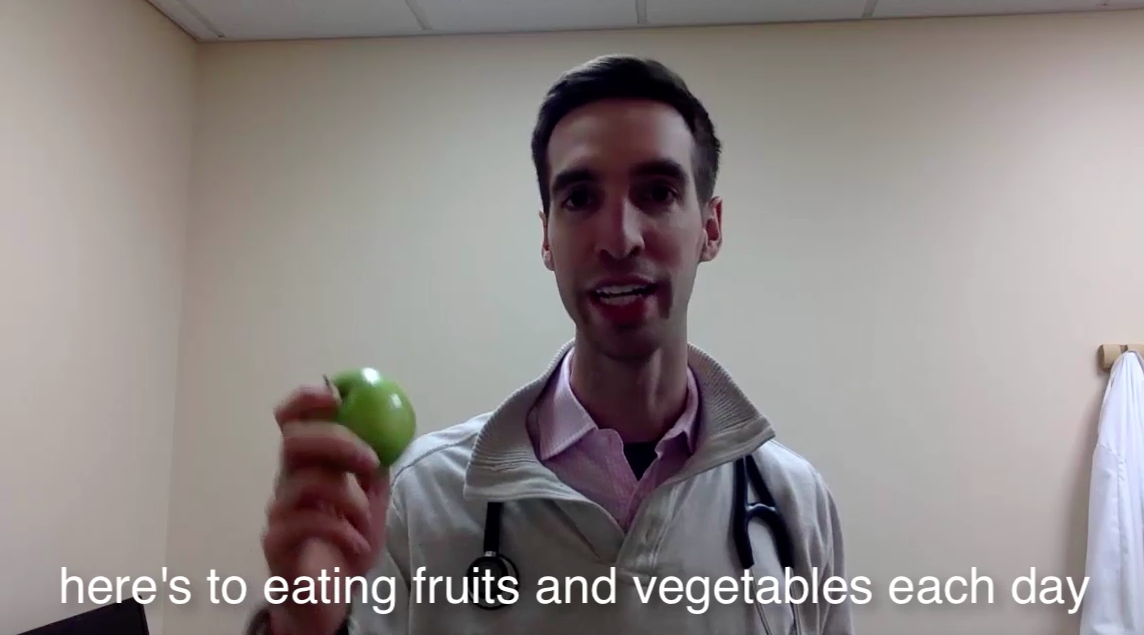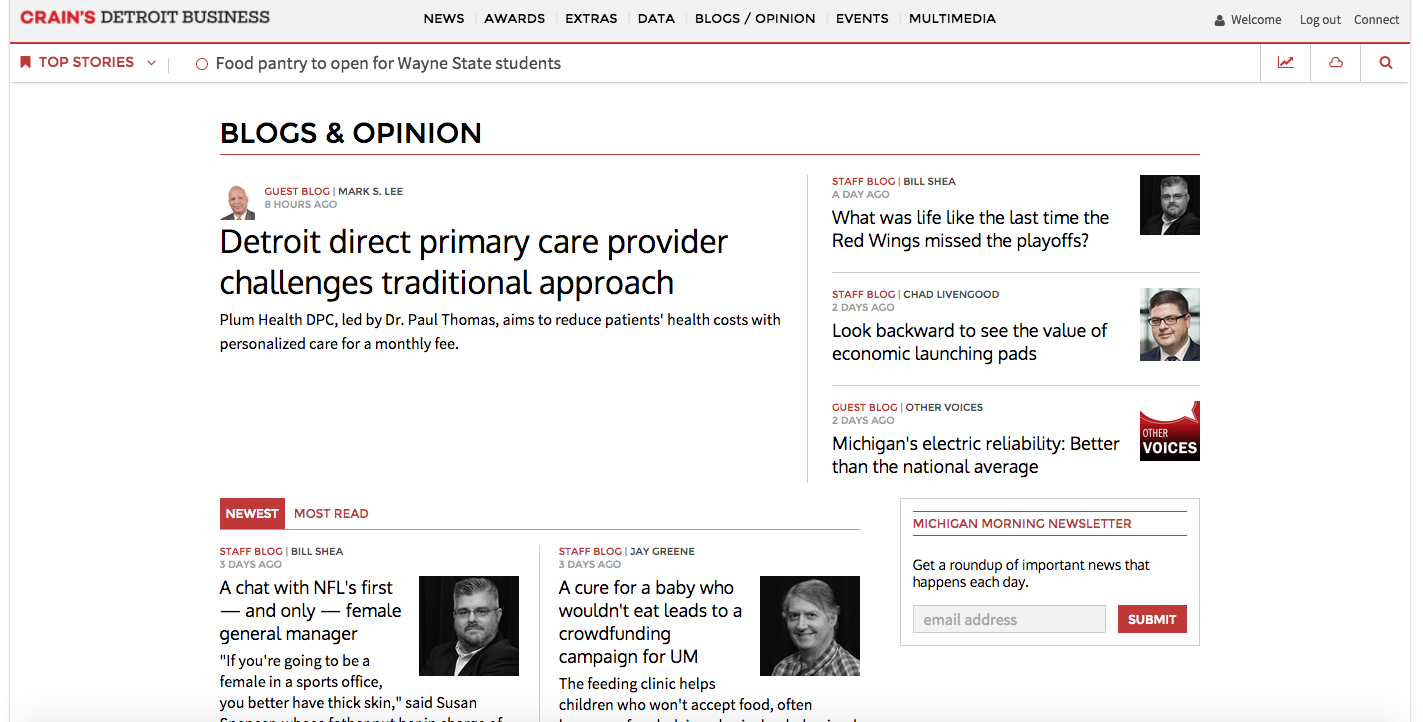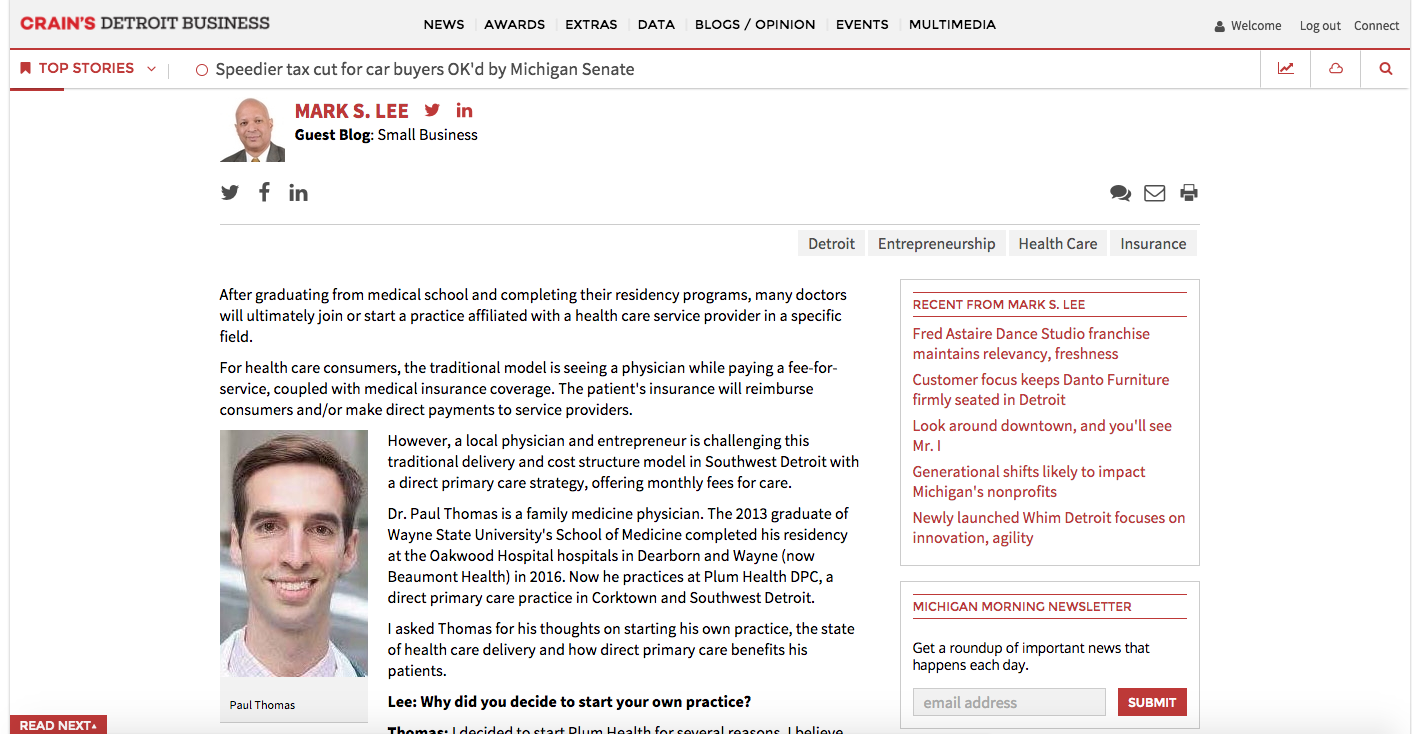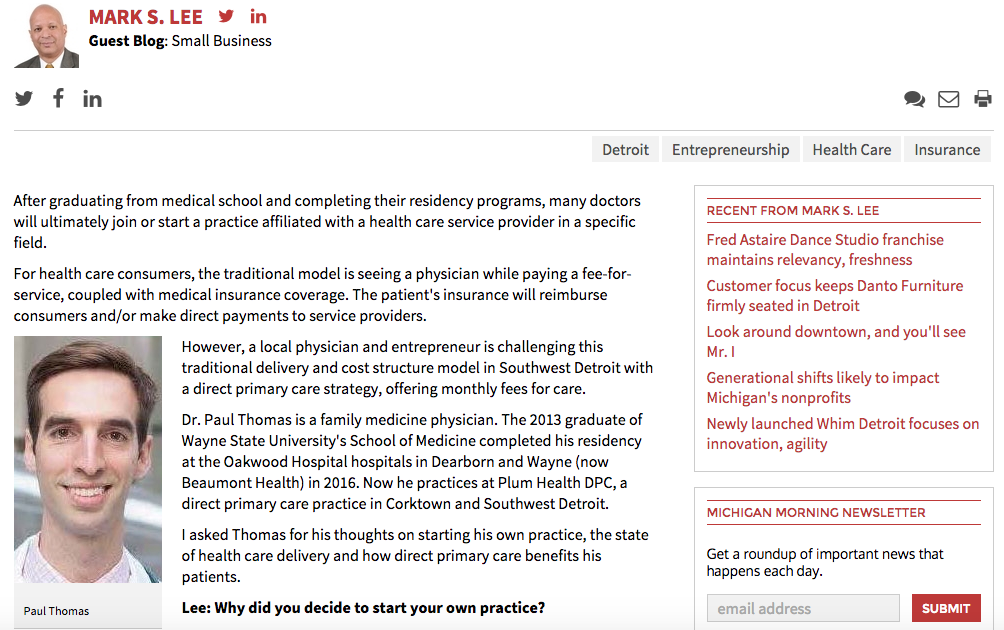Plum Health Blog
I Love Direct Primary Care
I love Direct Primary Care.
What is Direct Primary Care?
It’s not concierge.
It’s not insurance-based care.
It’s not a referral source for the hospital systems.
It doesn’t inflate the cost of care.
It doesn’t let people slip through the cracks of the health care system.
It’s affordable and accessible.
It’s comprehensive and compassionate.
It’s personable and reliable.
You can visit in person with your own doctor, for an hour if you need the time.
You can call, text , FaceTime, or email with your doctor.
You can communicate via Messenger or Instagram.
It’s medical care and a real relationship with an independent physician who truly cares about you and your family.
I love Direct Primary Care because it’s how primary care is supposed to be delivered.
Startup DPC Book Reaches Number 1 on Amazon in the Physicians Category
This is Dr. Paul Thomas with Plum Health DPC here in Detroit Michigan. We believe that healthcare should be affordable and accessible for everyone, and we are doing our part to make that happen here in Corktown, and Detroit, and beyond.
However, several doctors have reached out to me and asked how we made Plum Health such a successful direct primary care practice. How are we attracting new patients? How are we lowering the cost of healthcare? How are we lowering the cost of medications, labs, and imaging services? How are we cutting all of the bureaucratic red tape?
I answered all those questions individually for my physician colleagues, but I also saved those answers in a word document, which eventually became this book.
This book is intended to help family physicians and internal medicine physicians start and grow their direct primary care practices. We want to see more doctors adopt this model that lowers healthcare costs and puts patients first.
The response to the book has been tremendous, and we’ve received many great reviews and a ton of great feedback about the content of the book. Thank you so much to everyone who has purchased the book, thank you for everyone who has left a review on Amazon, and thank you for making us number one on Amazon in the physicians category. We sincerely appreciate all of you!
- Dr. Paul Thomas with Plum Health DPC
PS if you're a doctor looking to start a direct primary care practice, check out Startup DPC
Startup DPC: How to Start and Grow Your Direct Primary Care Practice is the number 1 new release on Amazon in the Physicians category!
Startup DPC Paperback is Now Available
Direct Primary Care Book Available in Paperback Format
The Startup DPC book is published and it feels amazing to have it in my hands. It took me 3 years to write this book, as I documented many of my experiences in starting and growing a direct primary care practice. I took all of my experience, knowledge, and wisdom and poured it into this text.
My goal is to help other doctors start and grow successful and thriving direct primary care practices. There are so many challenges and obstacles that they will face along the way, and I know that this book will help them overcome those challenges and obstacles.
Today was a big day for me, as I published the book on May 5th, and received my first few copies in the mail today. I'm really excited to see this direct primary care movement grow and I'm wishing all of the DPC doctors out there continued success. I know that we are improving health care for our patients, our communities, and our nation.
Thanks for reading and watching,
- Dr. Paul Thomas with Plum Health DPC
Detroit Demo Day Promo Video Features Plum Health
This year, the Quicken Loans Detroit Demo Day Promo Video and marketing materials features Dr. Paul Thomas of Plum Health DPC. We submitted a quote for their website as well:
“A big shout out to Quicken Loans Detroit Demo Day, who helped us accelerate our business growth through their fantastic program. Because of the exposure that Plum Health DPC received through the program, and the grant money that we won through the pitch competition, we are able to provide more people with affordable, accessible health care services in Detroit and beyond.”
I'm posting this today because the application is now live for the next Quicken Loans Demo Day Event! Read more about our big win, here, and read more about Demo Day and the application process, here.
If you’re a small business in Detroit and wanting to grow and expand your business, this is a fantastic opportunity to get more recognition in the community for your brand and your business, and if you have everything in order, you could potentially walk away with grant funding for your business or an interest-free loan from Quicken Loans.
Thanks for reading and have a great day,
Dr. Paul Thomas with Plum Health DPC
Promotional image from Quicken Loans’ Detroit Demo Day, featuring Dr. Paul Thomas of Plum Health DPC

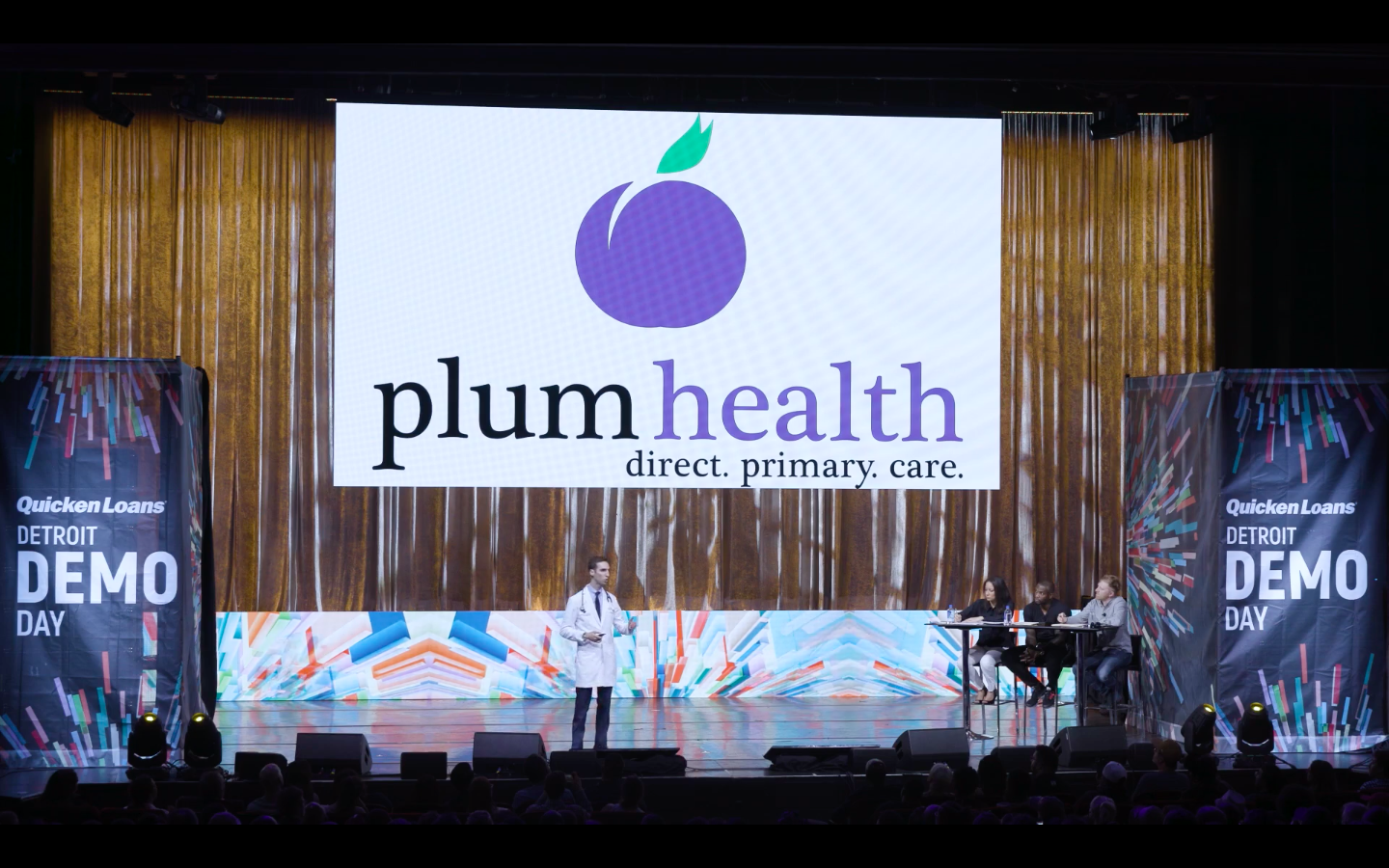

Family Doctor on Flashpoint with Devin Scillian
Today, we were featured on Flashpoint on WDIV with Devin Scillian. The conversation focused on Direct Primary Care, and our clinic in Southwest Detroit called Plum Health DPC, which is making healthcare affordable and accessible in Detroit and beyond.
Devin Scillian is the host of Flashpoint, and a highly respected journalist in Detroit, so it was a tremendous honor to be invited onto the program to discuss this important issue. Flanking Devin Scillian was Frank McGeorge, MD, an emergency room physician and the Good Health reporter for WDIV. Dr. McGeorge was brought in to provide an additional layer of insight into health care and ask questions about Direct Primary Care from the lens of a physician/health care insider.
We also discussed our book, Direct Primary Care: The Cure for Our Broken Healthcare System.
Below I will paraphrase parts of the show:
Direct primary care introduction
Devin Scillian: Should your doctor be subscription-based? A new model allows as many visits as needed, for one monthly rate. There was a discussion about new concepts in health care… For some time I’ve been wanting to talk about a new idea in Health Care, it’s called Direct Primary Care. It doesn’t come from your employer, or the government. It’s basically an agreement between you and your doctor - you pay a monthly fee to subscribe to your physician. All the visits that you might need that month are covered. You need medications? Well, they cut a deal on prescriptions, which you would pay out of pocket.
We’ve had a lot of debates about what to do with American Health care - there’s talk about single payer health care and a universal system. Getting less conversation, and we’ll correct that this morning, is the idea of Direct Primary Care, and the Author of a new book Direct Primary Care: The Cure for Our Broken Healthcare System, is with us this morning, Dr. Paul Thomas of Plum Health DPC. And we have Dr. Frank McGeorge, our medical reporter from WDIV Local 4, who will ask better questions than I would.
So you can get rid of health insurance?
Devin Scillian: The first thing I want to get to, is to get rid of insurance and the government?
Paul Thomas, MD: I unequivocally recommend that folks have health insurance, but for your routine primary care services, the costs are much less if you purchase them directly through your doctor. You want to maintain a health insurance plan that you’re comfortable with, and use the free market or Direct Primary Care services to the lower the costs of your meds, labs, imaging services, and doctor visits.
So this is a club, basically? and what is your Pricing like?
Devin Scillian: So, I would kind of use you and your partners like I belong to a club, basically?
Paul Thomas, MD: Yes, it’s a membership model for health care, so you can come in and see us any time you need to. Visits are included in our pricing structure:
The 2018 pricing for Plum Health DPC, as shown during an interview between Paul Thomas MD, Devin Scillian, and Frank McGeorge MD on Flashpoint on WDIV, Local 4 News.
Devin Scillian: Unless your in a health plan that I’ve never heard of, this looks really reasonable, much less than you and I are paying, doc (Dr. Frank McGeorge).
Dr. Frank McGeorge: This is a very different way of doing things, clearly, and it does make sense. I have to say, I really applaud what you’re doing, because I think it’s wonderful that you are getting back to the most basic form of providing health care, that is directly to the patient, cutting out all of the bureaucratic nonsense as much as possible. You don’t need a biller and coder in your office, you save that money right off the top, and you pass that savings directly onto the patient.
Biggest concerns about the direct primary care model?
Devin Scillian: So your biggest concerns with it are what?
Dr. Frank McGeorge: Well what’s interesting to me, is that you’re doing what we used to do in Family Practice one hundred years ago, you were the small town doc. Everyone would come to you with all of their problems. But the problem now is that back then you could know all of medicine, but now, medicine is so much more complex. I guess, how do you deal with specialty referrals? The things that are out of your family practice domain.
Paul Thomas MD of Plum Health DPC on Flashpoint with Devin Scillian and Dr. Frank McGeorge of WDIV Channel 4 in Detroit, Michigan, discussing Direct Primary Care.
Paul Thomas MD: The typical scope of a family medicine doctor is 70 - 80% of anything that you might walk into the doctor’s office with. So I can handle 70 - 80% of your concerns, the rest you would typically refer to specialists. Now in my model, we use an e-consult platform called Rubicon, where we can write up your case history and send it to a Board Certified Ophthalmologist or Dermatologist or Cardiologist with a photo or a copy of your EKG, and get a second opinion at no charge to you the patient.
Devin Scillian: No charge to me, because you’ve developed a relationship with these specialists.
Paul Thomas MD: Exactly, it’s an e-consult platform called Rubicon that any primary care physician can use, and I use it because I actually have the time to listen to you fully, to take down copious notes about your condition, and send those over to the specialist and get a second opinion within about 12 hours.
How many patients can a direct primary care doctor handle?
Devin Scillian: Have you figured out where the sweet spot is for how many patients you can handle?
Paul Thomas MD on Flashpoint with Devin Scillian and Dr. Frank McGeorge of WDIV Channel 4 in Detroit, Michigan, discussing Direct Primary Care.
Paul Thomas MD: The typical number of patients per physician in the Direct Primary Care model is 500 - 600 patients. Now, contrast that with the typical family doctor who has to have 2,400 patients, so they’re seeing 1% of their panel each day or 24 patients each day. In our model, when we see 1% of our panel, we see 5 - 6 patients each day. And, that gives me an hour per patient to really sit down with you and understand what you’re going through, and help you through that situation.
What is the pricing like for medications and lab work?
Devin Scillian: You and I have been looking at these price lists (to Dr. McGeorge), because they cut deals on prescriptions and on lab tests. With your trained eye, and the time you spend in the Emergency Room, how does everything look?
Those forms for your reference: List of our laboratory prices. List of our medication prices.
Dr. Frank McGeorge: This is clearly the way it should be. One of the things I’ve always rallied against is the opaqueness of how billing and charging is done in the medical care system. Frankly, if you go into hospital A versus hospital B, you don’t know how much you’re going to be charged for any given test because it’s different in each hospital. This (pricing) is great because it’s all laid out in advance and it looks like it’s done, basically, at cost.
Paul Thomas MD: Exactly, because you’re already paying the membership, I want to give you as much value for your healthcare dollar as possible. So, we make all of our prices transparent, and we only charge the cost of the medication, or the lab, or the imaging service so you get the most value out of the service as possible.
Can Direct Primary Care Doctors make money in this system?
Devin Scillian: I don’t know how to ask this delicately, but is this lucrative for you? Do you make a fair amount - enough money? Or are you just messing with the system?
Paul Thomas MD: As the membership grows, as the doctor gets to full capacity, you earn about what you would make as an employed physician, maybe a little bit less. But, we have a saying in the Direct Primary Care movement that nothing pays like autonomy. I can be the physician I was meant to be. And, in this model, it’s really inspiring for other doctors who want to join this movement because you have the ability to practice medicine on your own terms, and not at the dictates of insurance companies or government heath care systems.
The full video can be seen above, and on the Flashpoint website.
Thank you so much for reading and watching,
-Dr. Paul Thomas with Plum Health DPC
Paul Thomas, MD with Devin Scillian and Dr. Frank McGeorge of WDIV Detroit on the set of Flashpoint. The discussion on Flashpoint this week centered around Direct Primary Care, a new model for health care that aims to improve the quality of healthcare while decreasing overall costs.
Paul Thomas, MD of Plum Health DPC, Devin Scillian of WDIV Channel 4 News in Detroit, and Dr. Frank McGeorge, an Emergency Medicine Physician and broadcaster with the Good Health segment on WDIV local 4. During Flashpoint this week, we discussed Direct Primary Care and the opportunity that it provides to change our healthcare system from the ground up. Devin Scillian was also kind enough to mention our book, Direct Primary Care: The Cure for Our Broken Healthcare System.
Dr. Paul Thomas at the Future of Family Medicine Conference
Last month, I had the opportunity to speak with over 100 students and residents interested in the specialty of Family Medicine. This was at the aptly named “Michigan Future of Family medicine Conference” hosted by the Michigan Academy of Family Physicians. The event was held at Michigan State University and hundreds of students were able to attend on a Saturday morning in October.
The invitation for the fifth annual Michigan Future of Family Medicine Conference, hosted by Michigan State University and the Michigan Academy of Family Physicians (MAFP).
For students, it can be hard to get excited about the future of Family Medicine. Family Physicians work long hours, have to deal with tons of insurance bureaucracy and red tape, and earn less than their colleagues in other specialties. It can leave students deflated.
Dr. Paul Thomas of Plum Health DPC speaks at the Michigan Future of Family Medicine Conference 2018 Panel on Career Options, taken from the Michigan Academy of Family Physicians’ (MAFP) twitter account, here: https://twitter.com/MIFamilyDocs/status/1051106817705725953
However, I find that when I speak about Direct Primary Care and the opportunities that a DPC model of care can provide, students are energized and excited about the future of family medicine. You see, Family Medicine Doctors have the most tools in their tool set and can have the biggest impact on the community level - we lower admission rates to hospitals and decrease the cost of care for our patients. We also lower the rates of disease and death rates from disease.
But, as mentioned previously, Family Medicine is less desirable from the student’s perspective as it pays less and is a difficult job because of insurance hassles.
I think our profession, Family Medicine, is at a real moment of crisis, but also at a crossroads for opportunity. We can continue to be a part of the healthcare industrial complex, billing and coding, racking up charges on our patients, or we can adopt the Direct Primary Care model and serve our patients and our community with affordable and accessible health care services that are more just and compassionate in their delivery.
That’s my message, I’m glad to have had the opportunity to share it, and I’m very happy to have seen it resonate with so many energetic and eager medical students and residents.
Thanks for reading, and have a wonderful day,
-Dr. Paul Thomas, MD with Plum Health DPC, a Direct Primary Care service in Southwest Detroit
Dr. Paul Thomas of Plum Health DPC speaks at the Michigan Future of Family Medicine Conference 2018 Panel on Career Options, taken from the Michigan Academy of Family Physicians’ (MAFP) twitter account, here: https://twitter.com/MIFamilyDocs/status/1051097050086035456
I had the pleasure of speaking to an audience of over 100 + Medical Students and Medical Residents at the Michigan Future of Family Medicine Conference in October 2018. I shared the stage with Dr. Sheala Jafry, Dr. Fatin Sahhar, and Dr. Amy Keenum. The event was held at Michigan State University and hosted by the Michigan Academy of Family Physicians (MAFP).
Plum Health July Update
The last 3 weeks have been a whirlwind! About 3 weeks ago, we were featured on Channel 4 news in Detroit, aka WDIV. Within the week, we had roughly 2,000 unique page views, 100 phone calls, 200 emails, and 30 - 35 new sign ups for our service. It was an overwhelmingly positive response.
Our focus has been to take really good care of the new folks who signed up while maintaining our excellent standard of care for the people already signed up for our service. Our focus is on quality, not quantity.
Also, I attended the AAFP's Direct Primary Care Summit in Washington DC and met with some legislators and legislative assistants to discuss DPC and what we do at Plum Health in Detroit. This was a great trip and a great chance to talk with legislators about what we do at Plum Health and in the Direct Primary Care model, but also talk with our DPC colleagues.
Furthermore, we continue to save our members significant amounts of money on their medications, labs and imaging. We had a person sign up who was charged $100 for 10 tablets of valacyclovir (Valatrex). This medication is used to treat genital herpes. At our clinic, it costs about $2.35 for 10 tablets because it costs $0.23/pill.
Thanks for reading and have a great day,
Dr. Paul Thomas with Plum Health DPC in Detroit, Michigan
Plum Health featured in Good Life Detroit
This week, Plum Health DPC was featured on the blog Good Life Detroit. Jennifer is the creative spirit behind Good Life Detroit, and she did a fantastic job writing about our clinic and Direct Primary Care in general.
I really appreciated her perspective as a mother - she notes in the article that she has 5 children! - and that she paid $125 for a 20 minute doctor's visit for one of her children. Contrast that with our clinic, her child could have been seen for a full year for $120, with as many visits as needed included in that price.
This is how we make our primary care services valuable for the community that we serve. If you were not aware, Detroit is a large, low-income population. We recognize this as a fact, and have adjusted our pricing to be accommodating for the community that we serve.
Another great point that she brought up in the article is the frustration that people can experience when trying to reach their doctor! Sometimes reaching the doctor can be like pulling teeth. She puts it more eloquently, here:
"Another great benefit of Plum Health Direct Primary Care is patients have the opportunity to speak directly to Dr. Paul without the hassle of long wait times and call screenings. Instead of having to go through a series of steps just to talk to their doctor, patients can call, text, or email Dr. Paul directly. In some cases, some doctors require you to leave a message with the office staff for a callback.
"Most of the time the office staff member screen’s the doctor’s calls and you have to tell the staff member exactly what it is you need or what your question is. Then you wait for the doctor to call you back, which can be anywhere from the same day or one to two days later, all depending on the doctor’s schedule.
"Members of Plum Health have Dr. Paul’s cell phone number and email address. They can reach him anytime they need to ask a question in regards to their health."
There are several other great points that she makes throughout the article. I was really impressed at her depth and thoroughness. I also appreciate her helping to get the word out about affordable, accessible health care in #Detroit. We're trying to serve as many folks who need this type of care, and articles like these help us to reach communities outside of our circle of influence.
Thanks for reading and have a wonderful day,
Dr. Paul Thomas with Plum Health Direct Primary Care
Plum Health Direct Primary Care is in Detroit, Michigan. We practice old-fashioned family medicine, but we use technology to make ourselves more accessible to our patients when they need us! I love this graphic that Jennifer at Good Life Detroit created for us!
I also really liked this graphic that Good Life Detroit made about our pricing tiers at Plum Health DPC - really easy to read and understand!
Medication Price Comparison in Detroit
As a part of our service, we do free consultations for folks struggling to pay for their medications. Medication pricing is a hot topic in the health care field and overall health system - we've all heard about drug companies raking in huge profits on drugs that used to cost just a few dollars.
I bring this up because real people in our community are struggling to pay for their blood pressure meds, diabetes meds, blood thinners, and other pharmaceutical products. Even worse, they are paying inflated prices through the "retail pharmacy" like CVS, Meijer Pharmacy, or Walgreens.
We give folks free consultations at Plum Health, and a big part of this is price checking their medications. Today, I had someone in the community reach out to me to ask for a price check on a whole list of medications that they take. Here's what we found:
DRUG LIST PLUM HEALTH Price/pill, Price/month Insurance price/month
Atenolol 25 mg $0.018/pill or $0.54/month $12.99/mo
Carbidopa/Levodopa 250/10 $0.096/pill or $2.88/month $47.80/mo
Finasteride 5mg $0.073/pill or $2.21/month $15.40/mo
Flomax 0.4 mg $0.11/pill or $3.40/month $62.75/mo
Metformin 1000 mg $0.0129/pill or $0.38/month $12.99/mo
Levothyroxine 50 mcg $0.27/pill $8.25/month $33.67/mo
Plavix 75 mg is $0.06/pill $1.92/month $12.99/mo
Brilinta 90 mg is $5.54/pill $166.20/month $999.35/mo
It's eye opening, even after doing this type of medical care for the last 8 months, to see these prices side by side. The left hand column has the drug name, the second column has the Plum Health price per pill, the third column has the Plum Health price per month, and the final column has the insurance-based price per month.
Again, this gets at the main principle: if you use a third party payment system to purchase things in the market place, the prices become inflated. However, if you buy things directly from vendors in the market place using your own money, costs tend to be less. We are able to get these low prices because we buy medication in bulk from whole sale medication suppliers.
If you have any questions about medication prices, please feel free to call us at 313.444.5630. We routinely save folks about 50 - 90% on their medication prices. In the example above, this is about how much this person will save.
Have a wonderful day,
Dr. Paul Thomas with Plum Health DPC
Opinion Published in the Detroit News
Our opinion regarding Health Insurance and Health Care was published in the Detroit News last night, and it is currently on the front of the Opinion Page!
Our opinion made the top of the page for the Detroit News Opinion section on June 5th 2017.
Here's our opinion in full:
Health insurance does not equal health care. As Americans, we often conflate these two entities. But they are in fact separate.
Health care is when you see your doctor. They listen to your story, empathize, perform a physical exam, make a diagnosis, and discuss treatment options. They can also order tests and give you medications. The compassion, the sincerity, the relationship — that’s health care. Health insurance is what covers you in the case of a medical catastrophe, like if you’re involved in an accident, have a heart attack or a stroke. Health insurance is a financial tool to prevent you from going bankrupt in case these catastrophic events occur.
These may seem like obvious statements, but we’ve grown accustomed to a system in which health insurance covers everything, from flu shots to ICU. This may not be a terrible thing; we all need flu shots, and some of us may end up needing ICU care. The problem exists in how we pay for these services.
If we continue to ask insurance companies like Blue Cross Blue Shield and government entities like Medicaid and Medicare to pay for all of our health care services, from blood pressure medications to cardiac bypass surgery, costs will continue to be inflated.
So if you’re paying $10 for your lisinopril each month, know that it actually costs $0.37. If you’ve paid $120 to check your cholesterol this year, know that it actually costs about $6.55. If you’ve ever paid $150 for a chest X-ray, it actually costs about $40. When we use our insurance cards to pay for the basic, routine health care services, prices are inflated. Fortunately, we now have a choice, an opportunity to use free market principles to save money on our health care services. More Direct Primary Care clinics are popping up in Michigan and across the nation.
Direct Primary Care doctors ask that patients pay a monthly membership, which allows them unlimited visits with their doctor and the ability to call, text or email the doctor any time. These doctors also provide wholesale medications, at-cost labs, and at-cost imaging services. By cutting out the middle man and asking consumers to pay for their basic services, the cost of these basic services decrease. Typical savings for medications, labs and imaging services range from 50 percent to 90 percent.
Ideally, people will pair DPC services with a health insurance plan that fits their needs and their budget, and covers them in case of a catastrophic event.
Paul Thomas, M.D., is a family doctor at Plum Health Direct Primary Care.
A screenshot from our Opinion in the Detroit News on June 5th, 2017.
Thank you for reading and have a wonderful day,
Dr. Paul Thomas with Plum Health Direct Primary Care in Detroit, Michigan
You Should Own Your Health Information
You should own your information, especially when it comes to your health and wellness. Unfortunately, health care consumers don't have easy access to their own healthcare information, and this can lead to serious problems.
I firmly believe that you, the patient, health care consumer, or however you want to describe yourself, should be the sole owner of your healthcare information. When you visit a new doctor, you should take your health information with you, like a thumb drive or a credit card with an information chip.
With your permission, your doctor would review and evaluate you and your health information before making any treatment decisions. This would be closer to ideal than our current system in which healthcare systems or large hospital systems own your health information.
This may become problematic or even life threatening if your health records are kept with one hospital system, but you have to go to a different hospital system because of an accident or injury. Mistakes can be made if you lose consciousness and are unable to communicate your past medical history, allergies, and preferences.
Some hospital systems are beginning to allow patients access to their personal health information, but it is often through proprietary applications that may be difficult to navigate and even more difficult to share with different health systems or physicians.
In my practice with Plum Health Direct Primary Care, I consciously and deliberately share and make clear your health information. Of course, I only give you this information with your written permission. I share your information, lab results, diagnoses and treatment plans because it will allow us to make better decisions together.
I believe that when you are well-informed about your health status and equipped with the necessary information, we can make the best decisions about your health and treatment plans.
Furthermore, if you choose to seek a second opinion, the consulting doctor will have easy access to the information we discussed, and will therefore be able to make a better decision.
On a related note, I am really excited about the recent FDA approval for Direct-to-Consumer marketing of Genetic Health Information, namely 23andMe's Health + Ancestry product.
With only a saliva sample, 23andMe is able to produce a genetic health profile, with 10 potential genetic diseases including Alzheimer's Disease and Parkinson's Disease.
There are some pros and cons to this information. As I've stated above, with more information, you can make better decisions about your health care and how you want to live your life. On the down side, you may have a test with false positive or false negative results, or you may not understand the results at all.
In the case of a false positive, this would mean that you have tested positive for a condition that you may not have or may not develop. In the case of a false negative, this would mean that you have tested negative for a condition that you actually have or will develop.
These imperfections considered, I still think personal genetic testing will be a valuable tool as we move forward in this new health care ecosystem. It will enable patients and doctors to make better decisions about treatment. This is especially true as genetic profiles become more sophisticated and we may begin to learn how different genetic profiles are affected by different medications.
Thanks so much for reading and watching and have a wonderful day,
- Dr. Paul Thomas with Plum Health DPC
Plum Health Direct Primary Care in Midtown Detroit
This week, I was able to sit down with Pamela Owens of yb2c Marketing and talk about what we do at Plum Health DPC. We had a wide ranging conversation and it was a really fun time getting to know Pamela and her husband Keith Owens. They record their podcast out of Green Garage in Midtown Detroit. For the full episode, hit this link!
We dove deep on some issues, like why I've chosen to be in Detroit to practice Direct Primary Care. Fist, I am here because I want to give back to a community that has given a lot to me and my family. Personally, I received a world-class medical education from Wayne State University School of Medicine along with so many volunteer opportunities at free clinics across the city.
I learned a great deal by practicing medicine at the Detroit Medical Center, Henry Ford Hospital, Oakwood, St. John Hospital, Cass Clinic, the Student Run Free Clinic, and the Joy-Southfield Clinic. All of these learning experiences have shaped me into the physician that I am today.
I also see an opportunity in Detroit. This is a medically underserved area, with a dearth of primary care physicians. Because of my unique set of skills and training in Family Medicine, I am able to fill some of these gaps in care. I am proud to be providing this kind of affordable, accessible health care service in the City.
Finally, Detroit has provided many resources for small business growth. I've talked about this before, but being able to take classes at the Build Institute and with TechTown's Retail Boot Camp has allowed me to improve my business concept and execution substantially. It has also allowed me to network with several entrepreneurs in the community. Larger grant programs like the Motor City Match program has also provided funding for the build out of the next phase of my business, as Plum Health grows over time.
As a side note, If you haven't been to the Green Garage, it is a beautiful space in the Midtown community. It has been created in the most sustainable way possible, with almost all of the construction materials being repurposed from what had been in the building before the Green Garage built out that space. The materials were painstakingly conserved, and the space turned out wonderfully.
They hold a weekly lunch and meet up at 12 pm each Friday at the Green Garage, which is a great way to network and meet innovate people in the Detroit community. Here's a few photos from the last one that I went to (below).
Thanks for watching and reading,
- Dr. Paul Thomas with Plum Health Direct Primary Care
Plum Health out at America's Future Foundation Event
This week I was invited to speak at an America's Future Foundation meetup in Detroit. It was held at the Detroit Beer Company and the topic of discussion was free market healthcare. I was there representing Plum Health DPC and one of my colleagues, Chad Savage, MD of YourChoice Direct Care was there as well.
We talked for an hour about free market options for healthcare services in Detroit and Michigan, specifically Direct Primary Care. It was a great event and the audience members asked some great questions.
For example, people often ask about the difference between Direct Primary Care and Concierge Medicine. I wrote a blog post where I discussed the differences in detail, but in a Concierge Medicine Model, doctors charge a membership fee that is often greater than $100/month, continue to bill insurance for visits, and they do not typically offer money-saving ancillary services.
In contrast, Direct Primary Care doctors have membership fees in the $10 - $100/month range, do not bill insurance companies for services rendered, and typically offer money-saving ancillary services, like wholesale medications, at-cost labs and at-cost imaging.
Another common question about Direct Primary Care is about the legality of the practice. In 2014, Senator Patrick Colbeck spearheaded an effort in the Michigan Legislature to make Direct Primary Care "legal" in the State. I place "Legal" in quotation marks because it was not illegal before, but a grey area. Senate Bill 1033 of 2014 clearly defines Direct Primary Care and similar retainer-based medical services as legal in the State of Michigan.
Another common question is "how is this possible?", in reference to the savings on medication, labs and imaging services. As in, where does all that extra money go between the insurance-based prices for services and the direct prices? I often give examples of how I save my members on their meds, labs and imaging, and the attendees at this talk asked specifically about how I was able to save on these services.
It starts with wholesaling the medications and setting up contracts with independent retailers for lab services and imaging services. This way, we can negotiate at-cost pricing for services that you may need. These are often based on volume, so the more people who demand these services, the lower the overall costs. Then, I am not paying any middle men between these ancillary services and you the consumer. I do not mark up the prices on my meds, labs, or imaging services, because I want to provide you with the greatest amount of value for your healthcare dollar.
There were several other questions, but I will stop here! Again, it was a great meet-up and I'm looking forward to their next event! They have several chapters across the country, so you can see when and where their next events are happening on their Facebook page, just click "events".
- Dr. Paul with Plum Health DPC http://www.plumhealthdpc.com/
Direct Primary Care versus Concierge Medicine
The phrases Direct Primary Care and Concierge Medicine are sometimes used interchangeably, but they are distinct entities.
The Concierge Medicine movement began around the year 2000 with doctors charging an access fee for their services while still billing insurance companies. The average membership cost for Concierge Medicine is roughly $2,000/year and up to $15,000/year.
Contrast that with Direct Primary Care or DPC. The DPC movement began around 2010 with doctors like Garrison Bliss in Seattle and Josh Umbehr in Wichita among others. Memberships cost roughly $10 - $100/month. There is an emphasis in DPC on a monthly membership structure - members are not locked in for a 1 year commitment.
In Concierge Medicine, the membership costs allows for access. Because the membership cost is relatively high, these types of practices attract the top 1% - 5% income earners. These high income earners are relatively price insensitive, so they are not as concerned about saving money on medications, labs or imaging. These patients are willing to pay for these ancillary services via their insurance even though the price may be inflated.
In Direct Primary Care, the membership includes more services. DPC doctors typically don't charge per visit fees and they try to move away from fee-for-service type transactions. Many ancillary services are included in DPC memberships, like EKGs, Spirometry, Wart Removal, etc... In addition, DPC docs get their patients wholesale medications, at-cost labs, and at-cost imaging services.
Concierge Medicine clinics attract members via programs like "Executive Physicals" or "Executive Health". These are tailored to high-income earners like people in the "C-Suite", aka CEOs, COOs, an CFOs.
Direct Primary Care doctors focus on health maintenance, wellness, and the bread and butter primary care services like preventive health, screening tests, chronic disease management, and acute care needs.
Concierge Medicine practices often mandate that you carry a high-end insurance policy - these practices often bill their patients' insurance companies for routine visits or services.
Direct Primary Care doctors do not bill insurance companies for the services they provide. That means that DPC doctors can take care of patients across a wide spectrum of coverage. For example, if you are uninsured, underinsured, or fully insured, you can be seen at Plum Health DPC. This is true for most DPC clinics.
I put together a short video to emphasize some of these differences. The audio got a little out of sync near the end, so I'm sorry about that! I'll try to re-shoot it later this week!
- Dr. Paul with Plum Health
One last thing, if you’re a Primary Care Doctor or Allied Health Professional that is looking to Start and Grow a Direct Primary Care practice, check out our sister site www.StartUpDPC.com. You’ll find more information and in-depth courses on building the Direct Primary Care practice of your dreams.
Steady Growth in the First Quarter of 2017
Plum Health DPC is a Direct Primary Care practice in Detroit, Michigan. It is the only authentic Direct Primary Care practice in Detroit and Wayne County, and one of two authentic DPC practices in the State of Michigan.
When I started chasing the dream of Direct Primary Care in early/mid 2016, I wondered if this would be possible and/or sustainable. Could I really hope to spend an hour with each of my patients? Could I really operate a medical practice outside of the insurance-based system? Could I really be successful?
When I started making house calls in November and December, I experienced slow growth. I added only 10 people in those first two months. Part of the issue, in my mind, is that it's hard to visualize what I'm trying to accomplish. Unlimited visits? Wholesale medications? At-cost labs? It all seemed amorphous to those listening to my pitch.
Once I leased an office space (December 15th, 2016), the "idea" became more real for the people interested in signing up. Once inside the Plum Health DPC office, you can see the medications, the blood draw equipment, the scale, the otoscope/ophthalmoscope set, and the other accoutrements that make a doctor's office feel like a doctor's office.
Since that time and over the course of the last 3 months, we've experienced steady growth. My goal was to add about 20 new members each month, with a minimum of 15 and a maximum of 30 new members each month.
So far, we are on pace, meeting those targets each month. As our membership base has grown, I've noticed more of a "snowball" effect, where current members are beginning to refer friends and family to the practice! This has helped us remain sustainable.
Further, only 2 members have cancelled over the period of 5 months! Both instances were similar - young 20-somethings who signed up because they needed some help with an immediate issue. After a few months of membership, they were able to garner health insurance through an employer or another source, and couldn't justify both expenses because of a limited budget.
Finally, I am so grateful to the people who have given this Direct Primary Care practice model a shot - a huge thank you to our current patients/members who sustain the practice, leave us positive reviews, and spread the word to their family/friends/co-workers!
Sincerely,
- Dr. Paul with Plum Health
Health Benefits of Plums
Plums are a great source of fiber and vitamin C. I recommend eating 4 - 5 fruits and vegetables each day, and Plums can be a great part of this. When you eat a healthy balanced diet, you don't need to take as many supplements; the foods that are available for consumption have all the essential vitamins and minerals that we need to be healthy.
As an update, we were recently featured in Crain's Detroit Business, so a big thanks to their editorial staff and Mark S. Lee for giving me the platform to spread the word about Direct Primary Care. Here's a video update:
Thanks for reading and watching, and have a wonderful day! Also, Happy April Fool's Day!
- Dr. Paul with Plum Health DPC
Plum Health Featured in Crain's Detroit
This week, Plum Health DPC was featured in Crain's Detroit Business. The opportunity came up after meeting with Mark S. Lee on his program, Small Talk with Mark S. Lee. During the on-air interview, we only had 15 minutes to talk about Plum Health and Direct Primary Care. It simply was not enough time to get down into the nuances of what Direct Primary Care is, the mission of Plum Health, and the future of health care and health care policy in this country.
This follow up interview in Crain's Detroit allowed for a deeper dive into these nuances, and so I must thank Mark S. Lee and the Crain's Detroit editorial team for working with me and publishing this important piece. You can read the full article here.
I truly believe that Direct Primary Care will play a greater role in our health care ecosystem as people/health care consumers wake up to the actual cost of their medical care. By making health care prices transparent at Plum Health DPC, we allow people to use free market principles to purchase the health care that they need.
Thanks so much for reading, thanks again to Mark and Crain's Detroit, and thank you the readers, followers, patients, and supporters that make Plum Health DPC possible!
- Dr. Paul with Plum Health
How Many Direct Primary Care Practices in Michigan?
The number of Direct Primary Care doctors in Michigan is difficulty to quantify. A reasonable place to start is with a definition of what Direct Primary Care is and is not. Philip Eskew is both a lawyer and a DPC physician over at DPC Frontier, and he sets forth a good criteria:
FOR THE PRACTICE TO QUALIFY AS A DIRECT PRIMARY CARE, IT MUST:
1) CHARGE A PERIODIC FEE
2) NOT BILL ANY THIRD PARTIES ON A FEE-FOR-SERVICE BASIS, AND
3) ANY PER VISIT CHARGE MUST BE LESS THAN THE MONTHLY EQUIVALENT OF THE PERIODIC FEE
I wanted to apply this definition to the State of Michigan, my home state, to see how many "DPC" practices meet this criteria. As far as pure Direct Primary Care offerings open to the public, there are two: Chad Savage, MD with YourChoice in Brighton and Plum Health DPC in Detroit.
There are other Hybrid DPC offerings within clinics that also bill third party insurance companies: Dr. Younes in Dearborn, Dr. Tindle in Grand Blanc, and Dr. Kevin Roy in Saginaw. I take issue with the Hybrid practices, because you lose the accessibility piece that makes DPC such a great delivery model - these doctors are still seeing a significant number of insurance-based patients and offering DPC to a subset of patients. So if a DPC patient needs to be seen, they "jump the line" and are seen ahead of the insurance-based patients. This is less than ideal.
Premier Private Physicians offers what I would define as Concierge Care or Concierge Medicine. The membership is $200/month or $2400 for the year and some labs and vaccines are billed to insurance companies. Visits are included, but they do not have contracts for at-cost meds, labs, or imaging because their patients are typically high income earners/wealthier people who are not as cost sensitive.
The other category of "DPC" in the State is employer-based DPC. Some large employer groups like United Shore have contracted with a "DPC" provider like SALTA or ProactiveMD to have on-site doctors to care for their employees. These practices are not open to the public and people who are not employees at these companies cannot access these services.
Because the access to care is limited, this operates more like a third party structure as the large company finds that it saves money to pay a capitated rate for each employee to an on-site doctor, rather than the patient using their employer-provided insurance to seek out urgent care or emergency services. Unfortunately, employees may start to use the "DPC" doctor more for urgent care type visits and less for primary care, chronic care, or preventive services.
If you wanted to include all of the above practices in the definition of DPC, there are roughly 8 "DPC" providers in the State of Michigan. My argument is that there are only 2 "pure" or authentic DPC practices in the State of Michigan. Sincerely, I would love to see more doctors taking the plunge into authentic DPC medicine, and am here to inspire, encourage, and consult other doctors to do just that.
If you want to add to the conversation or debate, please send me a message or write a comment below!
Thanks for your time,
- Dr. Paul with Plum Health DPC
Plum Health at Rock CF Rivers Half Marathon
This morning, I was out at the Rock CF River's Half Marathon and 5K in Grosse Ile, Michigan. Rock CF is an organization that advocates for patients with Cystic Fibrosis across the country, and their global headquarters are in Detroit on West Grand Boulevard.
Emily Schaller is the founder of Rock CF and organizes this race to raise money for the organization. The Rivers Half Marathon started at Grosse Ile Middle School and ran the perimeter of the island. The Rivers 5K started at the Grosse Ile Airport and ended at the GI Middle School.
I was representing Plum Health DPC as the race doctor and I was stationed at Mile 7.5/8ish. Fortunately, there were no major course injuries to report and things ran smoothly - no pun intended!
I'm really proud of the Rock CF organization, their mission, and the work that they do in the community. If you'd like to be a part of Rock CF and/or donate to people with Cystic Fibroses, hit up their website!
As a physician, I recommend 30 minutes of exercise each day for 5 days each week. That's about 150 minutes of exercise each week. Aerobic exercise like running a 5K is a perfect way to get and stay in shape. Exercise has innumerable benefits from better heart and blood vessel function to better control of diabetes, high blood pressure, and depression.
Now that the weather is nicer, it's the perfect time to develop healthy habits like running or walking every day. My pro tip is this: hang your workout clothes on your bed post and make exercise the first thing you do when you start your day.
To learn more about how you can become healthier, reach out to me here!
Thanks for reading and have a great day,
- Dr. Paul with Plum Health
Plum Health DPC in Grosse Pointe
On Tuesday night we were invited to speak to a group called the Eastside Republicans at the Grosse Pointe War Memorial in Grosse Pointe Farms, Michigan about Plum Health and Direct Primary Care.
Other speakers were Chad Savage, MD of YourChoice Direct Care and Senator Patrick Colbeck, a staunch supporter of Direct Primary Care in Michigan. This is a part of a tour across the State, a series of events across Michigan where Senator Colbeck and Direct Primary Care doctors talk about free market options in healthcare.
This was the largest crowd on this tour, and there were about 100 people in the audience. There were some great questions asked and good information shared about DPC, health shared savings plans, and unique solutions for employers.
The next event will be in St. Clair Shores on April 24th - mark your calendars!
Thanks for reading and have a great day,
- Dr. Paul with Plum Health


















